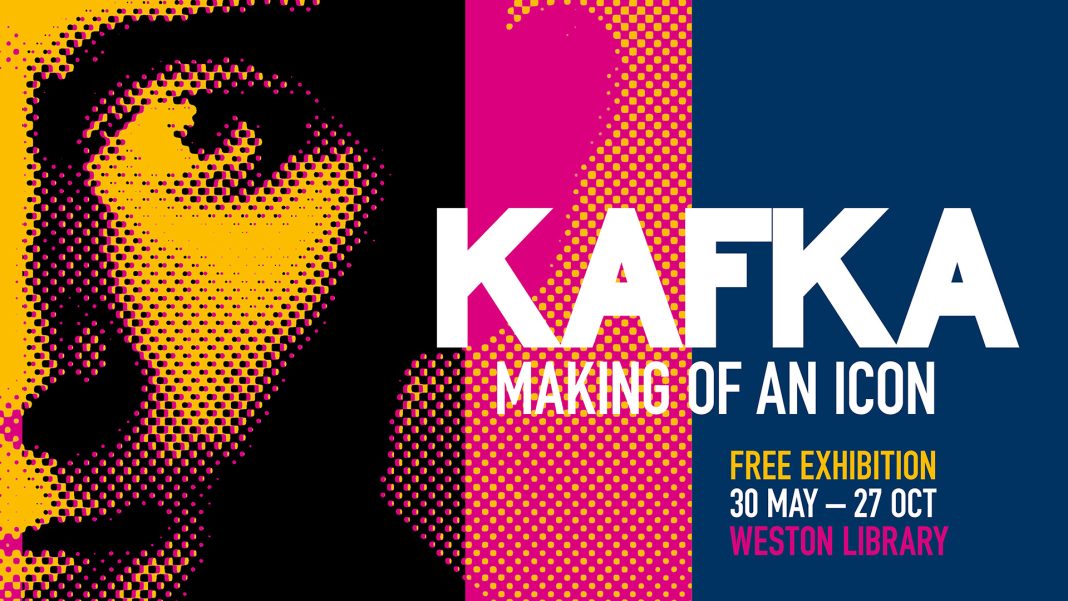One hundred years on from the death of the iconic Franz Kafka, Bodleian Libraries’ most recent exhibition at the Weston Library is an engaging dive into the life and legacy of the famous author. It is a project that marks the largest simultaneous showcase of Kafka’s works ever displayed alongside similar displays carried out by other libraries across the world.
What is truly striking about the exhibition is the stark dichotomy between the two interpretations of Kafka’s life and personality. On the one hand, much of the material on display is incredibly personal, made up of his private diaries, correspondence with his favourite sister, and even a ‘conversation slip’, a short note which is a poignant reminder of Kafka’s tuberculosis which left him unable to talk as he approached his death in the early 1920s. All of these documents give us a real insight into the psychology of the man behind the masterpieces.
Contrastingly, however, there is a sense of real mystery surrounding Kafka. This is in part, perhaps, due to the fact that he was just an ordinary man who worked full time for an insurance company. In other ways though it can be attributed to the fact that he died in 1924 at the age of 40 with so much left to give the world – even if he only ever shared his writing somewhat reluctantly. He supposedly burned around 90% of everything he ever wrote, and famously instructed his closest friend, Max Brod, to burn all of his writings after his death – an act which, thankfully, Brod failed to carry out. The precarity of our ability to view Kafka’s writings today makes looking at and reading his works feel even more touching. It is thanks to Brod and others that the Bodleian is able to hold such a wide-ranging collection of Kafka’s writing, including the original manuscript of The Metamorphosis, which is also on display in the exhibition.
It is this personal nature of the exhibition that drives one to question what Kafka himself would have made of the display one hundred years on from his death. Professor Barry Murnane, Associate Professor of German at Oxford and a curator of the exhibition, told Cherwell that while Kafka may have been embarrassed if he had seen the exhibition, given the personal documents and correspondence on display, the number of artists and authors who have posthumously engaged with his writing would have evoked a sense of pride in the writer, even for one so riddled with doubt as Kafka.
Overwhelmingly, the exhibition marks an attempt to provide an accessible look into the life of Kafka and his influence beyond his death. Murnane emphasises that “Kafka doesn’t just belong to experts” – a fact we are reminded of in the second half of the exhibition, which looks at the numerous authors and artists who have drawn inspiration from his works. Highlights include Andy Warhol’s Franz Kafka print (1980), a new artwork by Tessa Farmer commissioned for the purpose of the exhibition, and a dive into the influence of Kafka in modern-day Korea and Japan.
Professor Katrin Kohl, Professor of German Literature at Oxford and also a curator of the exhibition, told Cherwell that the world looks so different today to how it did at the time of Kafka’s death. One might imagine that were he to have awoken suddenly in 2024, he himself might have found it something of a ‘Kafkaesque’ experience. The exhibition closes with a brief look into the use of the word in contemporary media, which is a reminder of how influential Kafka’s style is to this day.
The Making of an Icon exhibition is just one of a whole host of events and projects ongoing at the University over the next few months to celebrate the life and works of Kafka. Over the weekend, a giant bug-shaped tent will appear in University Parks and play host to a range of events. On Monday, the Sheldonian will play host to a live reading of Kafka’s The Metamorphosis from a range of speakers including Vice-Chancellor Irene Tracey, as well as authors and professors.
Kafka: Making of an Icon opens on Thursday 30th May and runs until 27th October at the Weston library. Admission is free.


